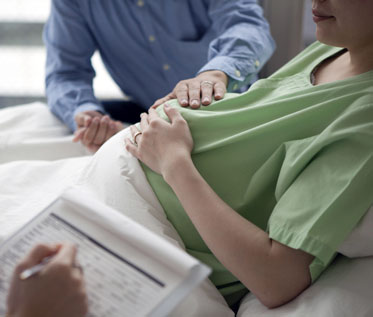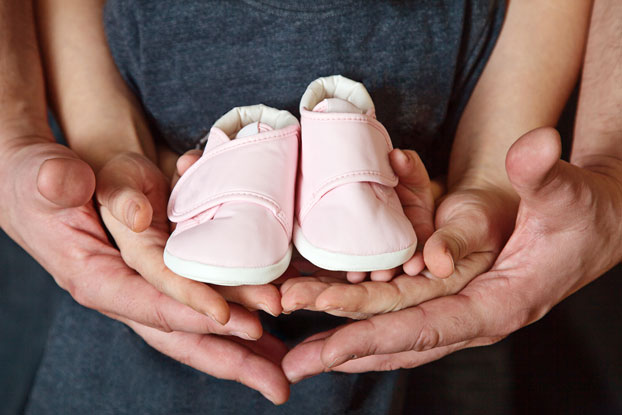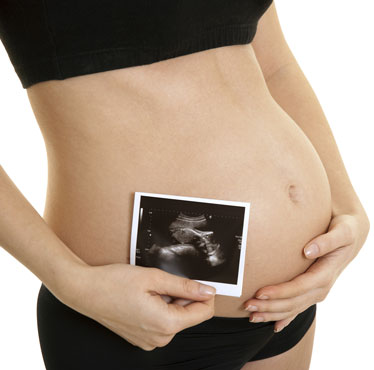Typically, pregnancies last about 40 weeks, starting the count from the first day of your last period to the date of the baby’s delivery. It is divided into three sections called trimesters. Most people refer to pregnancy as lasting “nine months,” although it is truly 10 lunar months of 28 days more or less, including the two before the egg is fertilized and implanted in your uterus.
If you plan to get pregnant or try to have a baby, these are some things you can be doing to get your body, your family, and your budget ready for the big day when baby arrives.

Checklist for before you get pregnant or if you are trying to get pregnant.
Consult with the doctor about medications you're taking.
If you take medications to treat a chronic condition, don't stop on your own, but contact the doctor right away and review your medications. Find out what is safe to take as your pregnancy continues. Some medications, vitamin supplements, over-the-counter medicines and even herbal remedies can harm a growing fetus. Many of these should be avoided while you are pregnant.
Stop smoking and taking any illegal drugs.
Smoking cigarettes and taking any “street” drugs, including using marijuana, increases the risk of problems during pregnancy including low birth weight, miscarriage, stillbirth and other serious issues. The fetus is especially sensitive to nicotine, which passes through the placenta and slows its growth. The first trimester of pregnancy is the time when the fetus is most at risk to harm from substances like alcohol, drugs, and nicotine. Ask your partner to stop smoking and using drugs, too, especially around you and the baby. Reducing the risk of birth defects is worth not lighting up whenever possible.
Stop drinking alcohol.
Even one alcoholic drink per day increases the odds of lower birth weight and increases the child’s risk of learning disabilities and hyperactivity disorder. No one knows why this is the case, so it is best to avoid alcohol completely.
 Reduce your caffeine intake.
Reduce your caffeine intake.
American Congress of Obstetricians and Gynecologists studies link high consumption of caffeine to miscarriage and other problems in pregnancy. They advise expectant mothers to limit intake to no more than 200 mg of caffeine per day – about the equivalent of one 11-ounce cup of coffee. Hot tea is a great transition away from that double shot espresso latte.
Start taking prenatal vitamins before you get pregnant.
Ask the doctor to prescribe prenatal vitamins before you get pregnant. Folic acid before conception and during your first trimester of pregnancy is vital to preventing neural tube birth defects such as spina bifida.
Get a complete checkup to make sure there is nothing that could affect your pregnancy.
Finding and identifying these factors before you get pregnant lets you manage them and increases the chances of having a healthy pregnancy and healthy baby. Your doctor will ask about diet, lifestyle, medical and family history, past pregnancies, medicines and other drugs you take, and they will do a thorough physical.
Your health, nutrition and existing conditions are vital to the growth and development of the embryo during the first few weeks of pregnancy when most of the major body systems and organs form. Medical conditions you have, such as diabetes, high blood pressure, seizures, and depression, can cause problems during pregnancy. These conditions need to be discussed with your doctor before you try to become pregnant.
Manage your weight.
There is good evidence that women who are significantly overweight or underweight have more trouble conceiving than do women who are near their appropriate weights. Make changes to your diet and activity level before you become pregnant, so these changes are already habits after you conceive.

Assess any environmental factors that may affect your pregnancy.
Many women work around toxic chemicals at home and on the job. Garden and home cleaning chemicals, solvents, radiation, lead, mercury and other chemicals on the job are common culprits that may be risky during pregnancy. They may make it harder to become pregnant, or they can harm a fetus.
Address any infections or sexually transmitted diseases.
Illness, infections, and STDs can harm both the mother and the developing fetus. Some can even cause illness and birth defects or can be passed on to the baby. They may affect your ability to become pregnant. It is best for you and your partner to get tested and treated before you try and get pregnant. Some vaccinations can prevent infections, but some are not safe to use during pregnancy. Your doctor can advise you on what to do.
Avoid foods that may be hazardous to you or a fetus.
Foods that could contain toxins, parasites or bacteria, such as undercooked meat, unpasteurized soft cheese, raw eggs, sushi, raw oysters or other raw shellfish, fish that is high in mercury, or raw sprouts are especially dangerous. Avoid deli-style salad, hot dogs, lunch meats, smoked meat and meat spreads, as well. These commonly carry parasites and bacteria if they are not carefully prepared.
Eat as healthfully as you can to prepare your body for pregnancy.
Fill your kitchen with healthy food, including a variety of proteins, fruits, multigrain pasta, yogurts, and vegetables. Your body will need many nutrients to grow a baby and provide energy. While you can get many vitamins from your prenatal vitamin, your calories and most of your nutrients must come from food. Read more about healthy pregnancy weight gain here.
Talk about parenting with your partner.
Develop a parenting plan, including talking about your parenting values, how you believe children should be raised and disciplined, how you will share chores - including the middle of the night feedings, etc.
Start budgeting for baby.
New babies come with expenses – diapers, clothes, food, toys, baby gear. Make budget adjustments before you become pregnant, as well as starting a savings account for your future baby.

Look at your employer’s maternity leave/paternity leave policies and how these might affect your income(s).
Most expecting parents request leave no later than 30 days before they use it, and many ask for it several months in advance. Also, think about whether you will return to work or stay at home with the baby. Find out if your employer offers family-friendly work arrangements or at-work day care. See if your short-term disability policy covers maternity or paternity leave for part of your delivery and recovery time.
Find out what you’ll need to do to add the baby to your health insurance policy.
Usually, there are strict timelines and documentation requirements to add a new baby to the insurance policy. Keep in mind that most insurance policies do not automatically add new babies to their parents’ insurance policies.
Checklist for as soon as you get a positive home pregnancy test
Make sure you're really pregnant.
Home pregnancy tests are usually accurate in detecting pregnancy the week after you miss a period. If the test shows negative, or only very faintly positive, wait another week and take another test.
Continue to make sure your activities are safe for pregnant women.
Avoid hazardous chemicals, lead, mercury, radiation, solvents, and x-rays. If you are trying to get pregnant, you may need to make changes to your job duties to continue to avoid these.
Build great sleep habits and squeeze in extra sleep when you can.
Early in your pregnancy, you may feel more exhausted than you thought possible. Sleep if you need to sleep, and don’t apologize for it. Your body is undergoing massive changes and needs rest.
 Contact your doctor for more prenatal testing.
Contact your doctor for more prenatal testing.
Your doctor will offer you different prenatal screening tests during the first trimester. These can give information about your baby’s risk for birth defects, Down Syndrome and other chromosomal defects. One test, chorionic villus sampling (CVS) is generally done at around 11 to 12 weeks of pregnancy.
Learn what indicates problems in pregnancy.
You will feel many new feelings, aches and pains when you are pregnant, it may become hard to determine what indicates a problem and what is normal. Some things may be problems depending how far along you are in your pregnancy or if you have certain other medical conditions. Your doctor can help you understand what is normal in your situation.
Prepare yourself to hear your baby’s heartbeat.
Sometime at one of your prenatal medical visits, usually between nine and 12 weeks, you may be able to hear your baby’s heartbeat using a Doppler fetal monitor. You probably won’t have your first ultrasound until between 16 and 20 weeks, although some women have one as early as four or five weeks if they need certain other tests.
Think about when you will tell people about your pregnancy.
Telling other people that you are pregnant is a very personal choice. Many women like to wait until their second trimester, when the risk of miscarriage has declined significantly. Other women tell people as soon as they know for sure the test is positive. If you are having a lot of morning sickness or other complications, or your job is potentially dangerous to your pregnancy, you may have to tell some people sooner.

Buying pregnancy clothes.
Many women experience sore breasts during pregnancy, and often this starts early in the first trimester. A supportive cotton maternity bra offers extra support, so you might want to try a few on to see if they help. Your breasts might increase a size or two, especially if this is your first pregnancy. Later in the pregnancy, your belly will expand and you will need maternity underwear. Some women prefer briefs, bikinis or even thongs for comfort as they progress through their pregnancy.
Get good nutrition, even if you have morning sickness.
Do the best you can to eat a well-rounded diet, even if nausea and morning sickness makes it difficult. At the very least, stay well-hydrated and eat when you can.
Understand your pregnancy timeline.
Determine your due date, even though it will not be a perfect prediction. Statistics show only about 5 percent of women deliver exactly on their predicted due date. Most women deliver within one or two weeks before or after that date. Nearly one in eight women have a baby prematurely, defined as three or more weeks before their predicted due date.
You'll need to decide when to share the news. Many women choose to wait until after the first trimester, when the risk of miscarriage drops significantly. You may want to tell loved ones, your other children, and your employer at different times.
Most women start to show visible signs of pregnancy by late in their first trimester or early in the second trimester.
What happens to your body during the first trimester and what should you do?
- Your belly will get bigger as your pregnancy progresses. You will gain weight. Your doctor will tell you about your weight gain goals.
- Your breasts will get larger, possibly up to a cup size bigger or more if this is your first pregnancy. They may also become painful or sensitive.
- Your skin may change. It might get brighter, darker or even get some pimples.
- Your hair may get fuller and your fingernails may grow faster.
- The amount of blood in your body will rise by 50 percent during your pregnancy. Many women report feeling like they always have a stuffy nose while they are pregnant.
- You will have to urinate more frequently. This is a combination of the increased blood flow in your body as well as your growing uterus pressing on your bladder.
- You will probably feel extra tired while you are pregnant. Sleeping might be difficult or very uncomfortable, especially when your belly gets larger. You may also have more frequent or unusual dreams.
- The stories about odd food cravings are true, too. Cravings, as well as food aversions, are very common during pregnancy.
- Heartburn, headaches, low back pain, leg cramps, swollen feet and hands, nausea, dizziness and other complaints are common during pregnancy. Women generally report they feel best during their second trimester. Some women say they feel great the entire time they are pregnant.
Managing your emotions during pregnancy.
Pregnancy and the hormone changes that go along with it can cause a range of emotions, sometimes all of them at the same time. Even if you are excited about being pregnant, it can also add stress to your life. There is a lot to worry about, including your health and the baby’s health, finances, working and more. Here’s what to expect for your emotional state during pregnancy.
- Mood swings are normal. Use your loved ones and friends for support and understanding. If mood swings become too intense, talk to your doctor. As many as 10 percent of women report struggling with depression during pregnancy.
- Pregnancy will change your relationship with friends, family and your partner both before and after the baby arrives. It will change your relationship with your partner the most. Even your relationship with strangers will change, as they try to touch your belly, ask intrusive questions and give you advice. You should probably come up with a plan on how to respond to these issues.
- Pregnancy may affect your sex life, even though sex during pregnancy is usually completely safe. Pregnancy might heighten or lessen your sex drive.
- Your pregnancy could also affect your job. Depending on your work schedule, your health and how you are feeling, you may have to change your schedule. Some mothers-to-be can work right up until they deliver, while others need to take time off to rest first.
Learning to deal with morning sickness.
Unfortunately, “morning sickness” is not always confined just to the mornings. For some women, symptoms are worse in the morning and then get better throughout the day. For others, symptoms strike any time at all, and for others, they last all day long. The intensity of the symptoms varies from woman to woman, and from pregnancy to pregnancy in the same woman. It affects about 75 percent of pregnant women during their first trimester.
For milder cases, eating small, simple meals throughout the day can help. Bland, room temperature food may help, as can ginger ale made with real ginger. Some women find that snacking on crackers throughout the day, even before they get out of bed in the morning, is helpful.
If you are not able to keep anything down, or you are losing weight, you need to talk to your obstetrician. They may want you to take anti-nausea medicine or B6 supplements that are safe and effective during pregnancy. Even mild cases of nausea can wear you out, and round-the-clock vomiting is uncomfortable as well as exhausting. Talk with your doctor about your symptoms and ways to find relief.
Usually, women find that morning sickness ends by around the 14th week of pregnancy. A small percentage of women struggle with symptoms on and off until delivery. Doctors have not determined what causes morning sickness, but it is probably a combination of all the changes taking place in your body.
Possible culprits in morning sickness include:
- Human chorionic gonadotropin (HCG). This hormone rises rapidly during early pregnancy and is the substance used to determine pregnancy on urine tests. Doctors are not sure exactly how HCG contributes to nausea, but consider it a strong suspect because the timing is right. Nausea in pregnant women tends to peak around the same time levels of HCG peak. Also, women who have conditions that lead to having higher levels of HCG, such as carrying multiples, tend to have higher rates of nausea and vomiting.
- Estrogen. Estrogen levels also rise quickly early in pregnancy, so it is also considered a possible cause of morning sickness.
- Sensitivity to odors and a stronger sense of smell. Many newly pregnant women feel overwhelmed by smells. Certain odors trigger their gag reflexes. Some researchers think this is a result of estrogen levels, but this has not been proven.
- A sensitive stomach. Some women have more tender stomachs than others, and they may be more sensitive to changes early in pregnancy. Some research also suggests women with the stomach bacterium H. pylori which is associated with GERD, may also be more likely to have morning sickness.
You are also more likely to experience nausea and vomiting during your pregnancy if the following apply to you:
- You are having twins or multiples. This could be due to higher levels of pregnancy hormones in your system.
- You are carrying a girl. Multiple studies have determined that about 55 percent of women with severe morning sickness in the first trimester of pregnancy are carrying girls.
- You had morning sickness in other pregnancies.
- You had nausea or vomiting as a side effect of taking estrogen-based birth control pills.
- You have a history of motion sickness or vertigo.
- Your mother or sisters had morning sickness.
- You have a history of migraines.
 How do my nausea and vomiting affect the baby?
How do my nausea and vomiting affect the baby?
Mild or moderate nausea and occasional vomiting due to morning sickness do not usually threaten the health of the baby. Even if you do not gain weight during your first trimester, that is usually not a problem, so long as you stay hydrated and can keep some food down. Most of the time your appetite returns and you will start gaining weight once the nausea subsides.
Problems arise when the nausea and vomiting keep you from eating a balanced diet for long periods of time. Make sure you take a prenatal vitamin to get the nutrients you need. Severe or prolonged vomiting is associated with low birth weight babies, preterm births, and smaller sized newborns. A large study of women hospitalized due to their vomiting determined that those who could gain at least 15 pounds during their pregnancy had no worse outcomes than other pregnant women, according to BabyCenter.
If I don't have morning sickness, does that mean I'm more likely to have a miscarriage?
BabyCenter reports that several studies show that women who have miscarriages are less likely to have had nausea. Presumably, this is due to a lower level of pregnancy hormones in their systems as a result of a placenta or fetus not developing normally. However, many women have completely normal pregnancies with little or no nausea or vomiting at all. Consider yourself lucky and don’t worry if you do not suffer from morning sickness as long as your obstetrician gives you the OK.
When should I talk to my doctor about severe nausea and vomiting?
Nausea and vomiting that gets so severe it prevents you from keeping food or liquid down, even water, juice, prenatal vitamins or medicines is called hyperemesis gravidarum. If your situation becomes this severe, it is time to talk to the doctor. Other times to call the doctor about nausea and vomiting include:
- You have lost two or more pounds
- You develop nausea or vomiting after your ninth week of pregnancy, or it continues into your fifth month of pregnancy
- You vomit blood
- You feel dizzy when you stand
- You show signs of dehydration, including dark urine or infrequent urination
- You have abdominal pain, headache, fever, or swelling in the front of your neck
If your condition gets this severe, the doctor may want you to go to the hospital so you can get IV fluids and medicine.
What is proper prenatal care?
As soon as you get a positive home pregnancy test, make your first prenatal doctor appointments. Be prepared by noting the date of your last period, as well as any questions you have. Your doctor will educate you about your pregnancy and reassure you about situations that arise during the next months.
You will learn about first-trimester screening for chromosomal abnormalities, DNA screening and more. After that, you will probably be seen every four weeks until a month or so before your due date. Most women have between 10 and 15 visits. Attend them all, even if you feel fine. Your doctor will check your health as well as your baby’s.
What happens to the fetus during the first trimester of pregnancy?
One of the most exciting things about being pregnant is keeping track of what is going on with the baby. During your first trimester, everything may seem overwhelming. It all happens quickly. Your hormones are going wild as they tell your body to nourish the fetus even before you know you’re pregnant.
Fetal development in the first trimester by week.
Although fetal development usually follows a predictable course, beginning at conception, keep in mind that measurements are approximate. Here’s what you can expect during the first 14 weeks of your baby’s development:
First Trimester, Weeks 1 and 2:
Even though the first two weeks are allocated to your pregnancy, conception usually occurs about two weeks after the first day of your last period. To figure out your approximate due date, count ahead 40 weeks from the start of your last period. By doing this, your period is counted as part of your pregnancy, even though you were obviously not pregnant then.
Ovulation occurs anywhere from 11 to 21 days after the start of your last period. When intercourse occurs, several hundred million sperm travel from the vagina into the uterus and into fallopian tubes, where they meet the egg. Once a sperm penetrates an egg, they combine to create a zygote – the single-celled basis for what will eventually be a baby.
The fertilized egg takes a day or two to travel through the fallopian tube into the uterus, with the cells dividing along the way. During this time, it is called a morula and then a blastocyst as it grows.
First Trimester, Week 3 Gestational Age (Week 1 Fetal Development)
By the time the ball of cells reaches the uterus, it has separated into two layers. The inner layer will become the embryo, and the outer layer will become the embryonic sac and placenta. Once the blastocyst reaches the uterus, about six to 12 days after fertilization, it embeds itself into the lining of the uterus. This begins the embryonic stage of pregnancy. At this time, the embryo goes through a lot of basic growth. The spinal cord, brain, and gastrointestinal tract begin to develop. The ball of cells is now an embryo and about the size of the head of a pin.
First Trimester, Week 4 and 5 Gestational Age (Week 2 and 3 Fetal Development)
Arm and leg buds become visible and look like paddles. The heart begins to beat, and the placenta has started to form. Rudimentary blood is pumped through the main vessels of the embryo’s body. Early structures that become eyes and ears have started forming. Over the next six weeks, all of your baby's organs will start to develop and function. The embryo is now about ¼ inch long.
By the end of the fifth week, the embryo is made up of three layers of cells. The top layer becomes your baby's outer layer of skin, parts of the nervous systems, eyes, the inner ears, and some connective tissues. The middle layer of cells becomes the heart and circulatory system. Some of this cell layer becomes the base for the baby's bones, kidneys, muscles, and parts of the reproductive system. The inner layer of cells becomes a tube lined with mucous membranes. From this, the lungs, bladder, and intestines form.
First Trimester, Week 6 Gestational Age (Week 4 Fetal Development)
The embryo grows rapidly this week. The neural tube along the baby’s spine begins to close. The heart is beating, and if you have a vaginal ultrasound, you may be able to hear a heartbeat. The brain continues to form, and its complex parts are beginning to develop. The embryo is starting to develop basic facial features such as the jaw and nose. The lungs are also beginning to grow. The baby’s body begins to take on a C-shaped curve. Webbed structures that look like paddles form on the embryo’s hand and foot buds. These eventually become toes and fingers. The embryo measures about ½ inch long.
First Trimester, Week 7 Gestational Age (Week 5 Fetal Development)
When the embryo is five weeks along, or you are in your seventh week of pregnancy, every major organ in the baby’s body has started to form. Even hair and nipple follicles are starting to form, along with eyelids and the tongue. The baby’s trunk has started to straighten, and elbows and toes become more visible. The embryo is about the size of a pencil eraser and weighs less than an aspirin.
First Trimester, Week 8 Gestational Age (Week 6 Fetal Development)
Six weeks after conception, your baby’s bones are starting to form, and her muscles can contract. The baby’s eyes are visible, and her nose and upper lip have formed. She is about one inch long. She moves around a lot now, but you cannot feel it yet. She only weighs about 4/100th of an ounce.
First Trimester, Weeks 9 through 13 Gestational Age (Weeks 7 through 11 Fetal Development)
 During week nine, the baby’s arms grow, and they can bend at the elbow. The eyelids and ears continue to develop, as do the toes. Eyes have formed. The embryo has lost its “tail” and looks more human by this time. The baby is about ¾ inch long.
During week nine, the baby’s arms grow, and they can bend at the elbow. The eyelids and ears continue to develop, as do the toes. Eyes have formed. The embryo has lost its “tail” and looks more human by this time. The baby is about ¾ inch long.
Ten weeks marks the end of the embryonic period and the start of the fetal period. The fetus measures about three inches long and weighs about one ounce. Genitals have formed into clearly male or female, but they still cannot be distinguished on an ultrasound. The eyelids close, and they do not open again until about the 28th week. The fetus can make a fist. Buds appear in the mouth that will become baby teeth. The head is about half the size of the entire fetus, and it is rounder than before. The baby is starting to develop her neck.
By the 11th week of pregnancy, the fetus still has widely separated eyes and low-set ears. The liver is just starting to produce red blood cells. The baby’s bones are starting to harden. The baby may measure two inches tall from the top of her tail to her bottom, and she may weigh up to ⅓ an ounce. She can even hiccup, although you cannot feel it yet.
First Trimester, Week 14 Gestational Age (Week 12 Fetal Development)
At the end of the first trimester, your 14th week of pregnancy or 12 weeks after conception, the baby has developed fingernails. The baby has a more human-like facial profile. At your prenatal checkup, you can probably hear a heartbeat with a Doppler monitor. If you have had an early ultrasound, you have probably already heard it. The baby measures about 2½ inches from the top of her head to her rump and weighs about ½ an ounce.
This concludes what to expect in your first trimester of pregnancy! Stay tuned for the next article in the series, What to Expect in Your Second Trimester of Pregnancy.
If you have any questions about the first trimester of pregnancy, or need to schedule routine prenatal care appointments with your obstetrician, contact us online here or by phone at (913) 948-9636.






